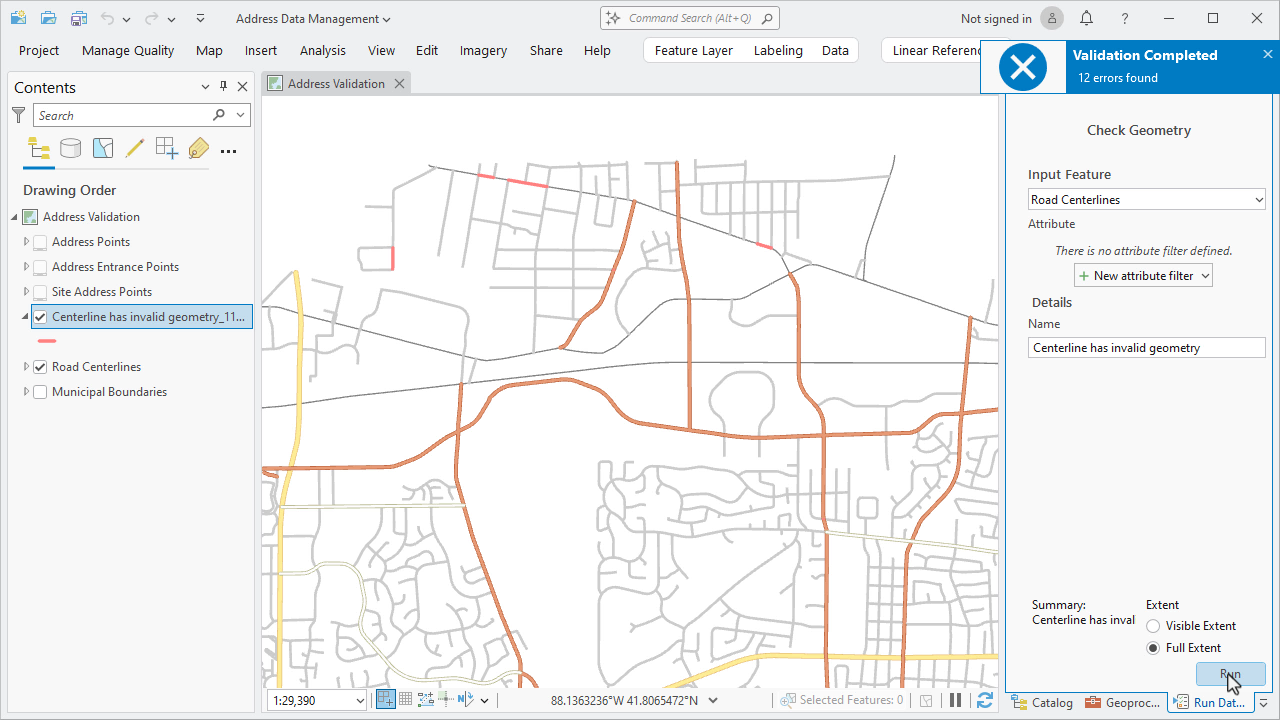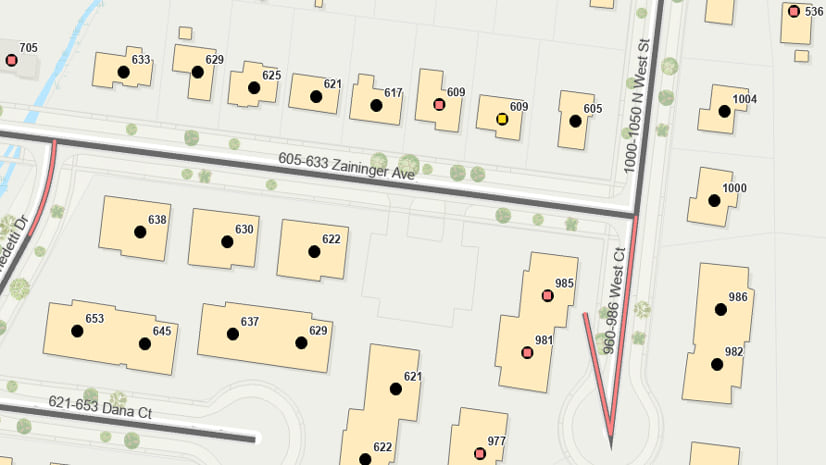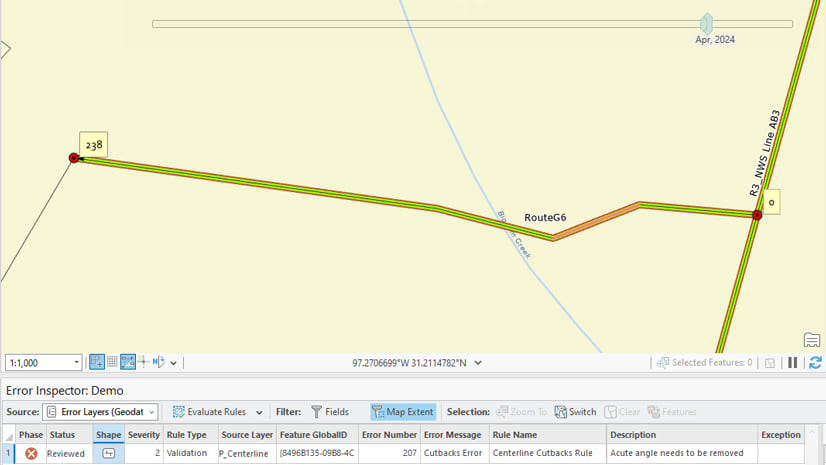ArcGIS Data Reviewer is an extension to ArcGIS Pro and ArcGIS Enterprise that automates, simplifies and improves data quality management workflows. The release of ArcGIS Pro 3.4 and ArcGIS Enterprise 11.4 introduces new automated review workflows for identifying poor-quality features, enhancements to data quality checks and improved support for visual review workflows. Read this blog for details on what’s new in the ArcGIS Data Reviewer November 2024 release.
Enhancements in automated review
Interactive quality control
A new workflow for automating the detection of poor-quality features is now available in ArcGIS Pro. This form of data quality control is easy to use and delivers results quickly. Different aspects of a feature’s quality can be assessed and often in just a few mouse clicks. Data quality checks supporting this form of data review include the following:
- The Check Geometry check finds features that contain invalid geometries.
- The Cutbacks check finds polyline or polygon features that contain high-angle turns that cause features to turn back toward themselves.
- The Domain check finds features that contain attribute values that do not comply with domain constraints.
- The Duplicate Feature check finds features of the same geometry type that contain duplicate geometry and have matching attribute values.
- The Feature on Feature check finds features from the same or two different feature layers that share a spatial relationship and returns them as results.
- The Subtype check features with improper or null subtype values.
- The Table to Table Attribute check finds features or rows that contain attribute values that meet a relationship you define and compares them to values in another feature class or stand-alone table.
- The Query Attributes check finds features based on a query against its attribute values.
Errors identified during check execution are saved as a layer in the map. The layer shows where the errors are located and other details about the error condition. Error results can assist in the following workflows:
- Testing a check’s configuration before implementing it as an attribute rule.
- As a tabular report to aid in determining whether the data is suitable for use in a project.
- Giving feedback to editors to fix errors and improve data quality.

Enhancements to automated checks
There have been a series of enhancements to data quality checks that automate the validation of data in both attribute rule and interactive quality control workflows. These enhancements include the following:
- The Domain check has been enhanced to improve usability in corrective workflows by identifying only those fields which contain invalid attribute values.
- The Table to Table Attribute check has been enhanced to support the evaluation of a subset of features/rows from another feature class or stand-alone table when comparing a feature’s attribution.
- The Invalid Event Measures, Find Event Gaps, Find Event Overlaps, and Find Orphan Events checks can now be used in file and mobile geodatabases to implement validation attribute rules that detect common errors in linear referenced events.
New quick-start resources
To help new users get familiar with services-based automated review, a new quick-start tutorial series is available to learn how to configure, deploy and use Data Reviewer-based attribute rules with ArcGIS Enterprise and ArcGIS Pro.
Enhancements in semiautomated review
Updates for visual review workflows
ArcGIS Pro’s Flag Missing Features tool supports visual review workflows that document missing features in data. This tool has been updated to improve efficiency and usability by enabling the creation of point, line or polygon sketches that identify specific geographies where there are missing features.
ArcGIS Pro’s Browse Features pane supports visual review workflows that document errors that may not be detected during automated review of data including the documentation of features that contain errors related to their shape or positional accuracy. The tool has been updated to improve efficiency and usability in the following ways:
- Automatically selecting and zooming to the extent of the currently selected feature.
- Supports the creation of point, line and polygon sketches to identify specific corrective actions required on a feature.
Managing a dataset’s participation in visual review workflows has also been simplified. The Data Reviewer property page can now be accessed from the Geodatabase properties dialog which allows management of all feature classes and tables in the geodatabase.

From this new page, you can now enable a dataset’s participation in visual review workflows and customize error messages that are available when identifying data errors with ArcGIS Pro’s Flag Missing Features or Browse Features tools.

Enhancements in ArcGIS Enterprise
The Evaluate REST operation has been updated to support ArcGIS Pro 3.4 check enhancements when using Data Reviewer-based validation attribute rules. These enhancements include the following:
- The Domain check has been enhanced to improve usability in corrective workflows by identifying only those fields which contain invalid attribute values.
- The Table to Table Attribute check has been enhanced to support the evaluation of a subset of features/rows from another feature class or stand-alone table when comparing a feature’s attribution.
The Write Errors REST operation has been enhanced to better support services-based visual review workflows. The enhancement adds support for polyline and polygon geometries when creating errors related to either an existing or missing feature.
For more information, please visit the Data Reviewer product page. If you have any questions, or ideas on what you’d like to see in future releases, join our Esri Community.



Commenting is not enabled for this article.